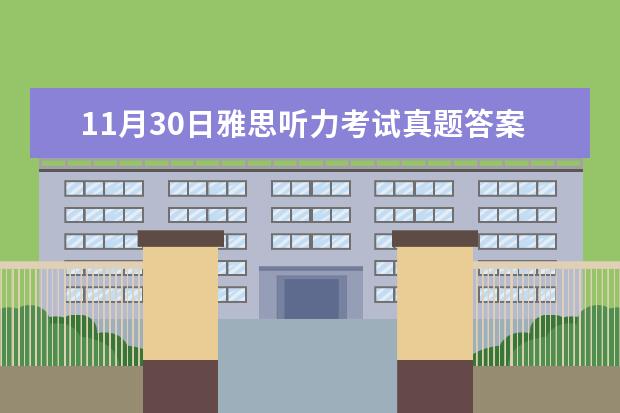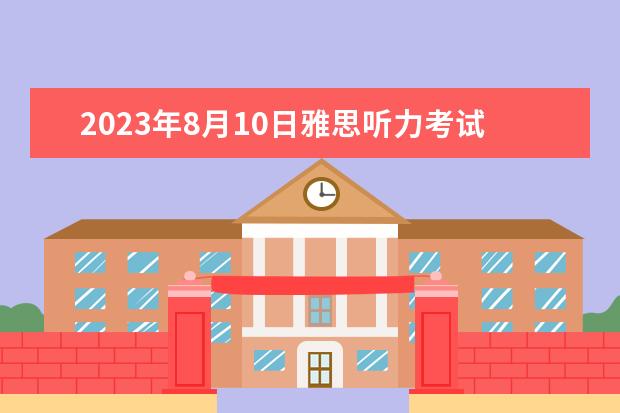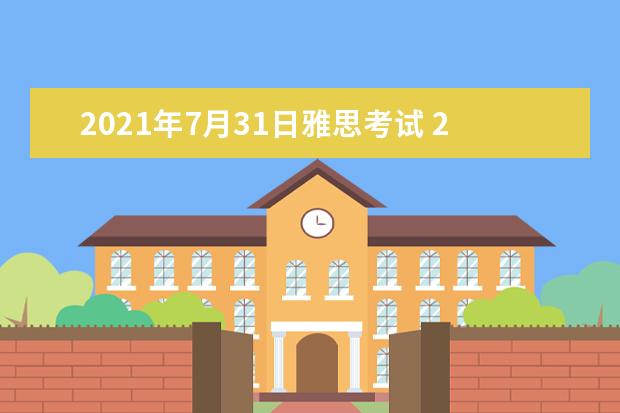当前城市:淄博[切换]
- 手机雅思无忧

扫码登录
今天雅思无忧小编整理了2023年7月31日雅思听力考试真题答案回忆(2023年7月10日雅思考试真题答案)相关信息,希望在这方面能够更好的大家。

做好雅思的阅读题除了掌握对的 方法 ,也离不开我们日常的辛勤练习,下面我给大家带来剑桥雅思阅读AUSTRALIA’S SPORTING SUCCESS及答案解析,一起加油吧!
剑桥雅思阅读AUSTRALIA’S SPORTING SUCCESS
READING PASSAGE 1
You should spend about 20 minutes on Questions 1-13, which are based on Reading Passage 1 below.
AUSTRALIA’S SPORTING SUCCESS
A They play hard, they play often, and they play to win. Australian sports teams win more than their fair share of titles, demolishing rivals with seeming ease. How do they do it? A big part of the secret is an extensive and expensive network of sporting academies underpinned by science and medicine. At the Australian Institute of Sport (AIS), hundreds of youngsters and pros live and train under the eyes of coaches. Another body, the Australian Sports Commission (ASC), finances programmes of excellence in a total of 96 sports for thousands of sport*en and women. Both provide intensive coaching, training facilities and nutritional advice.
B Inside the academies, science takes centre stage. The AIS employs more than 100 sports scientists and doctors, and collaborates with scores of others in universities and research centres. AIS scientists work across a number of sports, applying skills learned in one — such as building muscle strength in golfers — to others, such as swimming and squash. They are backed up by technicians who design instruments to collect data from athletes. They all focus on one aim: winning. ‘We can’t waste our time looking at ethereal scientific questions that don’t help the coach work with an athlete and improve performance,’ says Peter Fricker, chief of science at AIS.
C A lot of their work comes down to measurement — everything from the exact angle of a swimmer’s dive to the second-by-second power output of a cyclist. This data is used to wring improvements out of athletes. The focus is on individuals, tweaking performances to squeeze an extra hundredth of a second here, an extra millimetre there. No gain is too slight to bother with. It’s the tiny, gradual improvements that add up to world-beating results. To demonstrate how the system works, Bruce Mason at AIS shows off the prototype of a 3D *ysis tool for studying swimmers. A wire-frame model of a champion swimmer slices through the water, her arms moving in slow motion. Looking side-on, Mason measures the distance between strokes. From above, he *yses how her spine swivels. When fully developed, this system will enable him to build a biomechanical profile for coaches to use to help budding swimmers. Mason’s contribution to sport also includes the development of the SWAN (Swimming Analysis) system now used in Australian national competitions. It collects images from digital cameras running at 50 frames a second and breaks down each part of a swimmer’s performance into factors that can be *ysed individually — stroke length, stroke frequency, average duration of each stroke, velocity, start, lap and finish times, and so on. At the end of each race, SWAN spits out data on each swimmer.
D ‘Take a look,’ says Mason, pulling out a sheet of data. He points out the data on the swimmers in second and third place, which shows that the one who finished third actually swam faster. So why did he finish 35 hundredths of a second down? ‘His turn times were 44 hundredths of a second behind the other guy,’ says Mason. ‘If he can improve on his turns, he can do much better.’ This is the kind of accuracy that AIS scientists’ research is bringing to a range of sports. With the Cooperative Research Centre for Micro Technology in Melbourne, they are developing unobtrusive sensors that will be embedded in an athlete’s clothes or running shoes to monitor heart rate, sweating, heat production or any other factor that might have an impact on an athlete’s ability to run. There’s more to it than simply measuring performance. Fricker gives the example of athletes who may be down with coughs and colds 11 or 12 times a year. After years of experimentation, AIS and the University of Newcastle in New South Wales developed a test that measures how much of the immune-system protein immunoglobulin A is present in athletes’ saliva. If IgA levels suddenly fall below a certain level, training is eased or dropped altogether. Soon, IgA levels start rising again, and the danger passes. Since the tests were introduced, AIS athletes in all sports have been remarkably successful at staying healthy.
E Using data is a complex business. Well before a championship, sports scientists and coaches start to prepare the athlete by developing a ‘competition model’, based on what they expect will be the winning times.’ You design the model to make that time,’ says Mason.’ A start of this much, each free-swimming period has to be this fast, with a certain stroke frequency and stroke length, with turns done in these times.’ All the training is then geared towards making the athlete hit those targets, both overall and for each segment of the race. Techniques like these have transformed Australia into arguably the world’s most successful sporting nation.
F Of course, there’s nothing to stop other countries copying — and many have tried. Some years ago, the AIS unveiled coolant-lined jackets for endurance athletes. At the Atlanta Olympic Games in 1996, these sliced as much as two per cent off cyclists’ and rowers’ times. Now everyone uses them. The same has happened to the ‘altitude tent’, developed by AIS to replicate the effect of altitude training at sea level. But Australia’s success story is about more than easily copied technological fixes, and up to now no nation has replicated its all-encompassing system.
剑桥雅思阅读AUSTRALIA’S SPORTING SUCCESS题目
Questions 1-7
Reading Passage 1 has six paragraphs, A-F.
Which paragraph contains the following information?
Write the correct letter, A-F, in boxes 1-7 on your answer sheet.
NB You may use any letter more than once.
1 a reference to the exchange of expertise between different sports
2 an explanation of how visual imaging is employed in investigations
3 a reason for narrowing the scope of research activity
4 how some AIS ideas have been reproduced
5 how obstacles to optimum achievement can be investigated
6 an overview of the funded support of athletes
7 how performance requirements are calculated before an event
Questions 8-11
Classify the following techniques according to whether the writer states they
A are currently exclusively used by Australians
B will be used in the future by Australians
C are currently used by both Australians and their rivals
Write the correct letter, A, B or C, in boxes 8-11 on your answer sheet.
8 cameras
9 sensors
10 protein tests
11 altitude tents
Questions 12 and 13
Answer the questions below.
Choose NO MORE THAN THREE WORDS ANDIOR A NUMBER from the passage for each answer.
Write your answers in boxes 12 and 13 on your answer sheet.
12 What is produced to help an athlete plan their performance in an event?
13 By how much did some cyclists’ performance improve at the 1996 Olympic Games?
剑桥雅思阅读AUSTRALIA’S SPORTING SUCCESS答案
Question 1
答案:B
关键词:exchange of expertise, between different sports/collaborate, across a number of sports
定位原文:B段第2、3句“...and collaborates with… a number of sports …”
解题思路: 题干中讲到不同体育领域的专业知识交流正好跟原文中跨不同体育专家之间的合作相对应,理解意思即可容易找到正确答案。
Question 2
答案:C
关键词: visual imaging/3D, image
定位原文: C段第6句: “...shows off the prototype of a 3D *ysis …”
解题思路: 通过题干中的视频成像可以很容易找到原文中对应的3D和成像。
Question 3
答案:B
关键词: a reason for narrowing/ can’t waste time
定位原文: B段最后1句: “We can’t waste our time looking…”
解题思路: 题目中的research activity和原文中的scientific questions 属于同义表达,定位答题区域,发现此句话所要表达的意思是不在一些飘渺的、不切实际的科学问题上浪费时间,也就是说要缩小研究的范围。
Question 4
答案:F
关键词:AIS ideas reproduce/ copying
定位原文: F段第1句话 “Of course, there’s nothing…”
解题思路: 题干中的reproduce是复制的意思,之后从 文章 中发现 句子 有复制copying,即可以直接定位。
Question 5
答案:D
关键词:Obstacle, investigated/ impact, monitor
定位原文: D段第6句“... to monitor heart rate…”
解题思路: 题干提到理想成绩的障碍是如何被调查研究的,而读到对应句子之后看到正好是sensors(传感器)对于运动员跑步的impact(影响)进行研究的仪器,而且obstacles和impact对应。
Question 6
答案:A
关键词:Overview, funded support finance
定位原文: A段倒数第2句 “...finances programmes of excellence…”
解题思路: finances是解题关键,意思为资助,正好跟题干中funded support表达了相同的义项,直接对应。而且之后一句话提及以上项目所提供的服务和建议,可以确信答案。
Question 7
答案:E
关键词:Calculated before an event/ using data, well before a championship
定位原文: E段第1句、第2句 “Using data is a complex business. Well before a championship, ...”
解题思路: 首先通过well before a championship和文章中before an event定位到E段, 之后发现后面提及的“竞争模型”作用就是计算时间和速率,因此内容对应上calculate,此时可断定答案的位置。
Question 8
答案:A
关键词: digital cameras
定位原文: C段倒数第3句: “..SWAN system now used in Australian national…”
解题思路: 前一句已经提到该系统已广泛应用于澳大利亚各项全国赛事之中,而没有提到其他国家,因此可以判断应该只有澳大利亚人在使用。
Question 9
答案:B
关键词:sensor
定位原文: D段第7句:“...With the Cooperative Research Centre for Micro…”
解题思路: 找到相同对应词sensor,读其前后的句子,发现有 Melbourne,断定是澳大利亚人的发明。之后要特别留心动词develop运用现在进行时,表示正在开发;而且注意之后的定语从句采用了将来时,所以可以断定此发明还没有完成,应该属于将来的成果。因此选择B。
Question 10
答案: A
关键词:protein
定位原文: D段倒数第4句: “… AIS and the University of Newcastle…”
解题思路: 非常容易在前面第一句话中找到跟题目protein tests所对应的词语a test ...protein。之后细读前后句,发现后面一句话对于此项科技成果的受益者文章中只提到AIS运动员,即澳大利亚体育学院的运动员,隶属于澳大利亚,所以应该选择A。
Question 11
答案:C
关键词: altitude tent
定位原文: F段倒数第2句: “The same has happened to the ‘altitude tent ’…”
解题思路: 文章中很容易找到用引号括起来的题目中的名词 短语 ,因此只要细心读原句,就会发现开头的‘The same has happened...’同样的事情也发生在……根据 经验 应该顺着文章向上追溯,发现跟‘altitude tent’相同情况的是1996年奥运会上澳大利亚人受益的流线型散热运动服现在全世界都在用。因此 ‘altitude tent’也被世界各国应用。所以答案应该选择C。且根据此段话大意可以了解文章只提到两种研究成果被别国运用,即髙原帐蓬和流线型散热服。所以可以间接判断前三项成果是由澳大利人独享的。
Question 12
答案: (a)competition model
关键词: help an athlete plan, produced / prepare the athlete by, developing
定位原文: E段第1句“Using data…”
解题思路: Help an athlete plan their performance 对应上prepare the athlete by之后,要认真研究题目所问的是what is produced,断定所作答案必定要填一个名词。因此要细读原文发现有单词developing恰与produced相对应,中文意思是“开发”,则答案必定是开发之后的名词。
Question 13
答案: (by)2 percent/%
关键词: 19% Olympic Games, cyclists, improve
定位原文: F段第3句“At the Atlanta…”
解题思路: 分析问句是 ‘By how much... improve’,意思为“提高了多少”,可以判断出答案需要写一个数字。因此仔细阅读相关语句找到 sliced as much as two per cent off cyclists ‘and rowers’ time。很快就可以找到数字百分之二
。
以上就是雅思无忧小编给大家带来的2023年7月31日雅思听力考试真题答案回忆(2023年7月10日雅思考试真题答案)全部内容,希望对大家有所帮助!
雅思培训 2023年4月雅思考试(4月10日)阅读真题答案 2023年8月31日雅思听力考试真题及答案
2023年4月雅思考试(4月10日)阅读真题答案 2023年8月31日雅思听力考试真题及答案
2023年4月雅思阅读考试真题答案(4月24日)您好,我是专注留学考试规划和留学咨询的小钟老师。在追
2023年11月29日 03:59 11月30日雅思听力考试真题答案 2023年8月10日雅思听力考试真题及解析 2023年8月31日雅思听力考试真题及答案
11月30日雅思听力考试真题答案 2023年8月10日雅思听力考试真题及解析 2023年8月31日雅思听力考试真题及答案
2019年11月30日雅思听力考试真题答案上周完成了11月的最后一次雅思考试,大家考得怎么样呢?下面
2023年10月19日 19:05 2023年11月20日雅思听力考试真题及答案 2023年8月10日雅思听力考试真题及解析 2023年8月31日雅思听力考试真题及答案
2023年11月20日雅思听力考试真题及答案 2023年8月10日雅思听力考试真题及解析 2023年8月31日雅思听力考试真题及答案
2023年11月20日雅思听力考试真题及答案您好,我是专注留学考试规划和留学咨询的小钟老师。在追寻留
2023年11月07日 21:18 2023年8月31日雅思听力考试真题及答案(2023年7月10日雅思听力考试真题答案)
2023年8月31日雅思听力考试真题及答案(2023年7月10日雅思听力考试真题答案)
2023年8月31日雅思听力考试真题及答案您好,我是专注留学考试规划和留学咨询的小钟老师。在追寻留学
2023年11月15日 18:32 2023年8月31日雅思听力考试真题及答案 2023年11月20日雅思听力考试真题及答案 2023年8月10日雅思听力考试真题及解析
2023年8月31日雅思听力考试真题及答案 2023年11月20日雅思听力考试真题及答案 2023年8月10日雅思听力考试真题及解析
2023年8月31日雅思听力考试真题及答案您好,我是专注留学考试规划和留学咨询的小钟老师。在追寻留学
2023年11月16日 15:54 2023年8月10日雅思听力考试真题及解析(2023年8月31日雅思听力考试真题及答案)
2023年8月10日雅思听力考试真题及解析(2023年8月31日雅思听力考试真题及答案)
2023年8月10日雅思听力考试真题及解析您好,我是专注留学考试规划和留学咨询的小钟老师。在追寻留学
2023年11月20日 13:27 8月31日雅思听力考试真题及答案 2023年11月20日雅思听力考试真题及答案 2023年8月10日雅思听力考试真题及解析
8月31日雅思听力考试真题及答案 2023年11月20日雅思听力考试真题及答案 2023年8月10日雅思听力考试真题及解析
2019年8月31日雅思听力考试真题及答案八月末的雅思考试已经圆满结束了,你想知道真题和答案吗?就来
2023年11月23日 21:36 2023年8月10日雅思听力考试真题及解析(8月31日雅思听力考试真题及答案)
2023年8月10日雅思听力考试真题及解析(8月31日雅思听力考试真题及答案)
2023年8月10日雅思听力考试真题及解析您好,我是专注留学考试规划和留学咨询的小钟老师。在追寻留学
2023年12月06日 14:49 2021年7月31日雅思考试 2021年7月10日雅思听力考试真题答案
2021年7月31日雅思考试 2021年7月10日雅思听力考试真题答案
雅思考试主要是通过对考生听、说、读、写四个方面英语能力的考核,综合测评考生的英语沟通运用能力,实现“
2023年07月24日 23:12 请问2023年4月雅思考试听力真题答案 2023年8月31日雅思听力考试真题及答案 11月30日雅思听力考试真题答案
请问2023年4月雅思考试听力真题答案 2023年8月31日雅思听力考试真题及答案 11月30日雅思听力考试真题答案
本文目录一览:1、请问2023年4月雅思考试听力真题答案2、2023年8月31日雅思听力考试真题及答
2023年10月18日 20:35